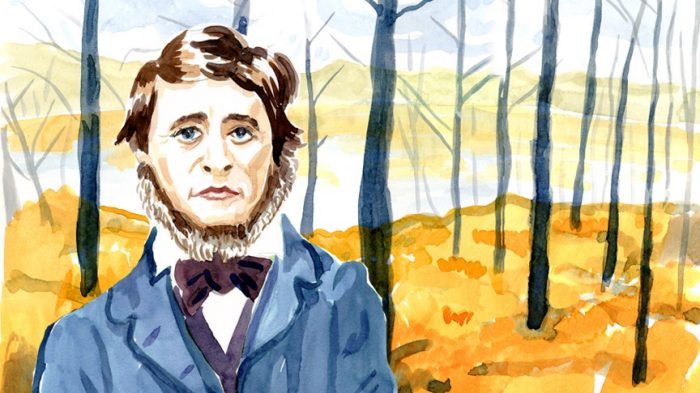Happy Birth Year, Henry David! Thank You For the Gift
“Only that day dawns to which we are awake.” – Henry David Thoreau, Walden
July 11, 2017 ~ Written by: W.B. “Bud” Kirchner
As with most of the topics I write about I will eventually address the issue of the relevance to the world of business but for now let’s consider two quotes we will come back to:
- “Do you have the patience to wait
Till your mud settles and the water is clear?
Can you remain unmoving
Till the right action arises by itself?” - “In my walks, I would fain return to my senses.
What business have I in the woods
if I am thinking of something out of the woods?”
As the article unfolds see if you can determine which is from a Chinese scholar from 500 B.C. and which is from an American writer from 1850.
Henry David Thoreau
As the world acknowledges the 200th anniversary of the birth year of Henry David Thoreau, from many perspectives I choose to recognize him for his contributions to the world of mindfulness and therefore to the world of business. In other words on his birth year I am suggesting we celebrate the gift he gave us by sharing his ‘natural’ experiences.
Ralph Waldo Emmerson who was a friend and mentor introduced Thoreau to Walden Pond when he was 28 years old and where he stayed for about two years. The friendship and introduction was based on mutual interests in the philosophies of ancient India.
Thoreau was, of course, one member of the “eloquent” and popular transcendental triumvirate including him, Emmerson and Whitman. However for the purposes of this article, it is his personal journey that is of most relevance.
Thoreau’s governing principle is captured in this quote from Pearson.
“The human soul, deep within, is divine, and that this divinity is to be found throughout nature.” – Henry David Thoreau – “We become like a still lake of purest crystal”
Mindfulness
The message of Thoreau was that mindfulness can occur if we become aware of our surrounding. In the case of Walden Pond this involved the natural annual cycles of color, animals and plants or as in Pearson’s words:
“…, the fourth major state of consciousness, beyond waking, dreaming, and sleeping. This state Maharishi characterizes as “the simplest form of human awareness.” One’s mind settles inward, beyond perceptions and thoughts and feelings. Consciousness rests within itself, awake to itself alone, serene and unbounded, a silent ocean.”
In far less eloquent words the experience of Thoreau has been described as his sucking out the marrow of life.
All of this and more is documented in his book Walden published in 1854 and has been described as part personal declaration of independence, social experiment, voyage of spiritual discovery, satire, and manual for self-reliance. I, however, would describe it as a remarkable validation of mindfulness.
“You must live in the present, launch yourself on every wave, find your eternity in each moment.” – Henry David Thoreau
Staggering amount Thoreau’s thoughts are found in Wherever You Go, There You Are: Mindfulness Meditation In Everyday Life by Jon Kabat-Zinn. It is replete with references, anecdotes and quotes.
Clearly the author believes Thoreau was embracing the tenets of mindfulness.
- “Waking up and living in harmony with oneself and with the world”
- “Examining who we are, with questioning our view of the world and our place in it”
- “Cultivating some appreciation for the fullness of each moment we are alive”
- “It is simply a practical way to be more in touch with the fullness of your being through a systematic process of self-observation, self-inquiry and mindful action. There is nothing cold, analytical or unfeeling about it.”
Perhaps, the best indicator of the relevance of the Thoreau/Walden experience is his description “He chose to put his life on the line in order to revel in the wonder and simplicity of present moments.”
In Thoreau’s own words:
 “I went to the woods because I wished to live deliberately, to front only the essential facts of life and see if I could not learn what it had to teach, and not, when I came to die, discover that I had not lived.”
“I went to the woods because I wished to live deliberately, to front only the essential facts of life and see if I could not learn what it had to teach, and not, when I came to die, discover that I had not lived.”
And in those of Kabat-Zinn:
“It reeks of paradox. The only way you can do anything of value is to have the effort come out of non-doing and to let go of caring whether it will be of use or not. Otherwise, self-involvement and greediness can sneak in and distort your relationship to the work, or the work itself, so that it is off in some way, biased, impure, and ultimately not completely satisfying, even if it is good. Good scientists (You can replace with businessperson) know this mind state and guard against it because it inhibits the creative process and distorts one’s ability to see connections clearly.”
Now to come full circle to the world of business:
“Leaders who are mindful tend to be more effective in understanding and relating to others, and in motivating them toward shared goals. Hence, they become more effective in leadership roles.” – William George, Harvard Business School Professor and former Medtronic Chairman and CEO
I have written extensively about the positive impact of mindfulness on businesspersons.
- Daniel Kahneman Meets Dalai Lama
- What Can Paying Attention To Your Breath Do For You?
- TPN vs. DMN – Neural Mechanisms and Mindfulness
- TPN vs. DMN – Brain Structure and Mindfulness
I have also written directly on nature and the magic it represents.
- Are you Creating Environments Designed to Enhance Relationships?
- How Did I Get Here From There?
- How Embodied Is Your Cognition?
Finally, I can offer up a personal endorsement. I have gone to great lengths to recreate and share (http://www.youtube.com/watch?v=BPYZ9I6Yqm0I) a modern day Walden Pond.
In closing, the first quote is from Lao Tzu and the second is from Thoreau.
Bibliography
- Jon Kabat-Zinn – Wherever You Go, There You Are: Mindfulness Meditation In Everyday Life
- Craig Pearson, Ph.D. – Henry David Thoreau – “We become like a still lake of purest crystal”
- Benjamin Reiss – Happy birthday to Henry David Thoreau, a great sleep scholar
Relevant Business Brain Model articles
- How Did I Get Here From There?
- Are you Creating Environments Designed to Enhance Relationships?
- How Embodied Is Your Cognition?
- Daniel Kahneman Meets Dalai Lama
- What Can Paying Attention To Your Breath Do For You?
- TPN vs. DMN – Neural Mechanisms and Mindfulness
- TPN vs. DMN – Brain Structure and Mindfulness
Total words excluding bibliography and title – 962
About the Author: W.B. “Bud” Kirchner is a serial entrepreneur and philanthropist with more than 50 years of business success. He is not a scientist or an academic but he does have a diversified exposure to neuroscience, psychology and related cognitive sciences. Generally speaking, the ideas he expresses here are business-angled expansions of other people’s ideas, so when possible, he will link to the original reference.

